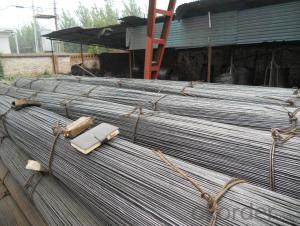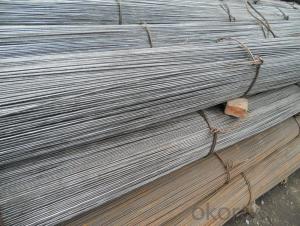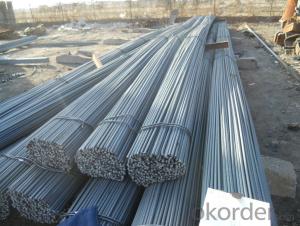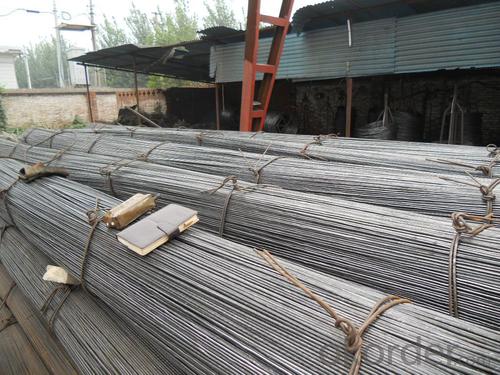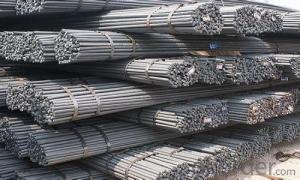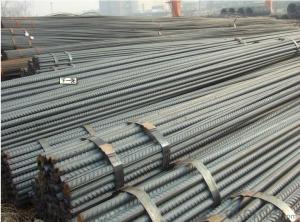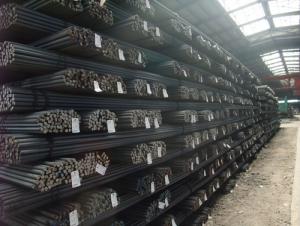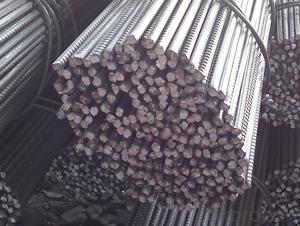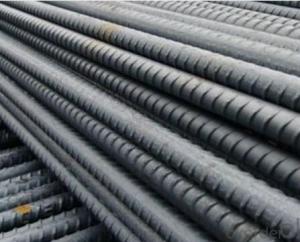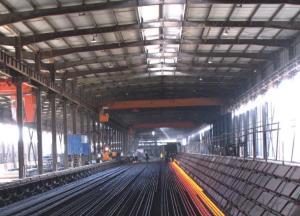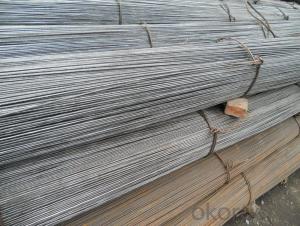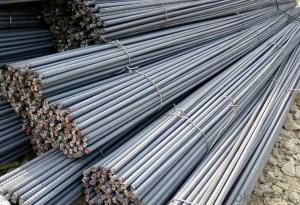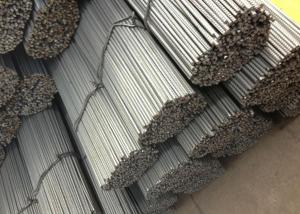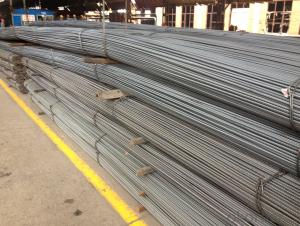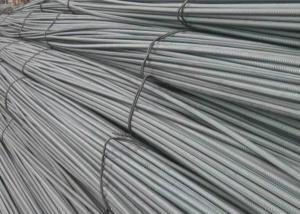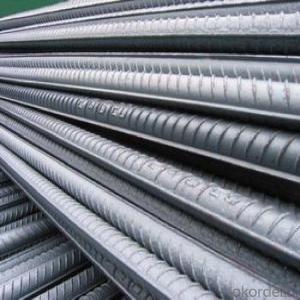rebar steel 6mm/hot rolled deformed steel rebar
- Loading Port:
- Tianjin
- Payment Terms:
- TT OR LC
- Min Order Qty:
- 25 m.t.
- Supply Capability:
- 23000 m.t./month
OKorder Service Pledge
OKorder Financial Service
You Might Also Like
Specifications
1.Standard: BS4449,HRB400 ,ASTM A 615, GR460B
2.Dia: 6-32 mm
3.Usage: for building,etc
4.MOQ:25 tons
Steel rebar
a.Length: 9m,12m
b.Diameter: 6-32 mm
c.standard: JIS/ASTM/BS/GB
d.material: HRB335/HRB400
Deformed Steel Rebars | |
OD | 10-32mm |
Length | 6-13.5m |
Standard | ASTM ,SB,GB and so on |
Grade | A 615 Gr40,A 615 Gr60,A 615 Gr75 BS4449 Gr 460 HRB 335,HRB 400,HRB 500 |
Application | Building construction |
Market | Middle east, North/South America, Europe, Asia,Africa etc |
Certificate | BV,SGS,MTC |
Delivery time | Within 30-45 days |
Payment terms | TT,L/C |
Package | Seaworthy packing or as your required |
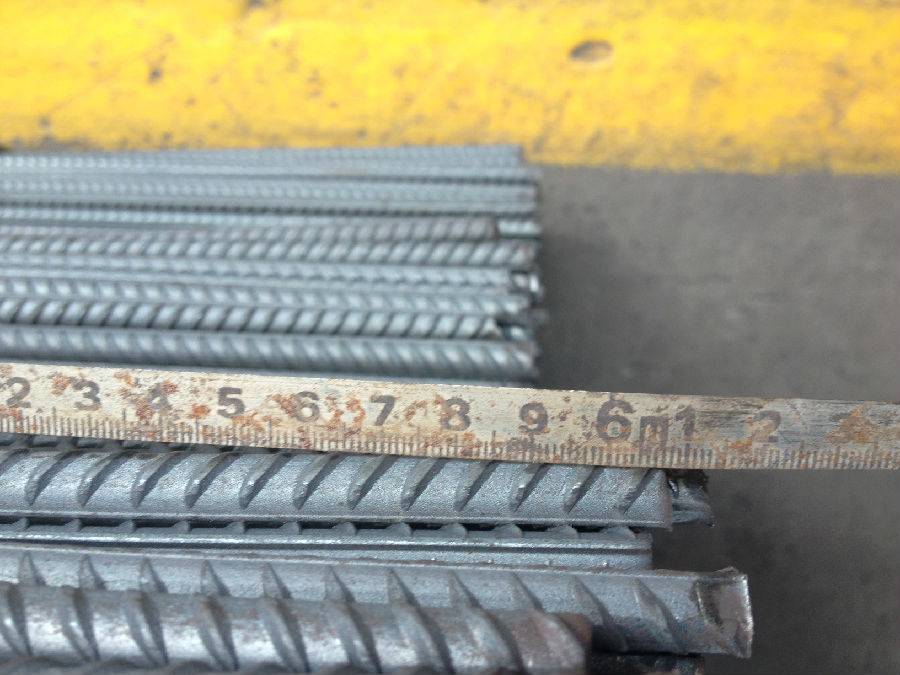
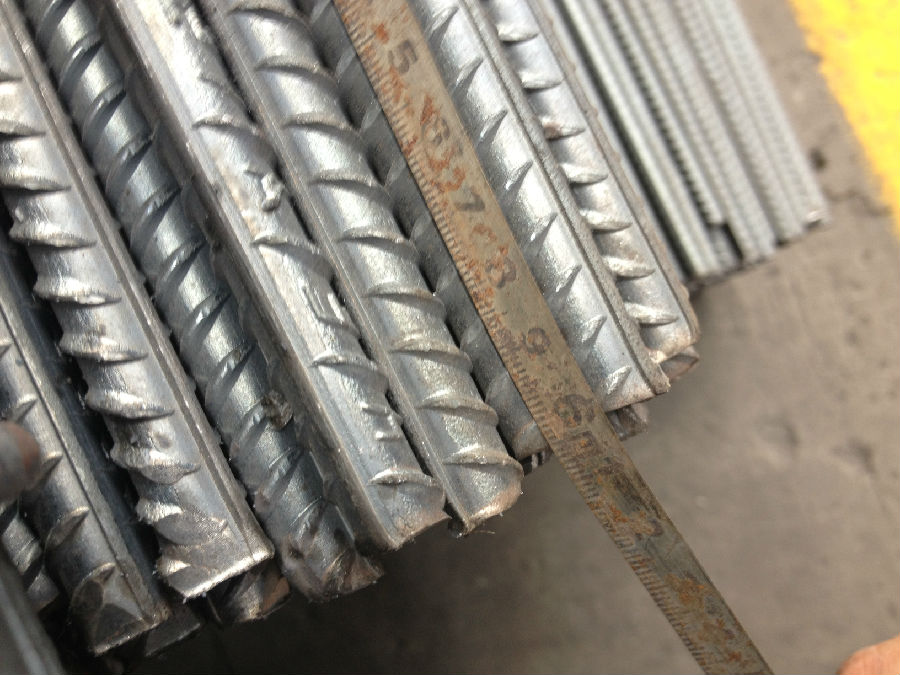
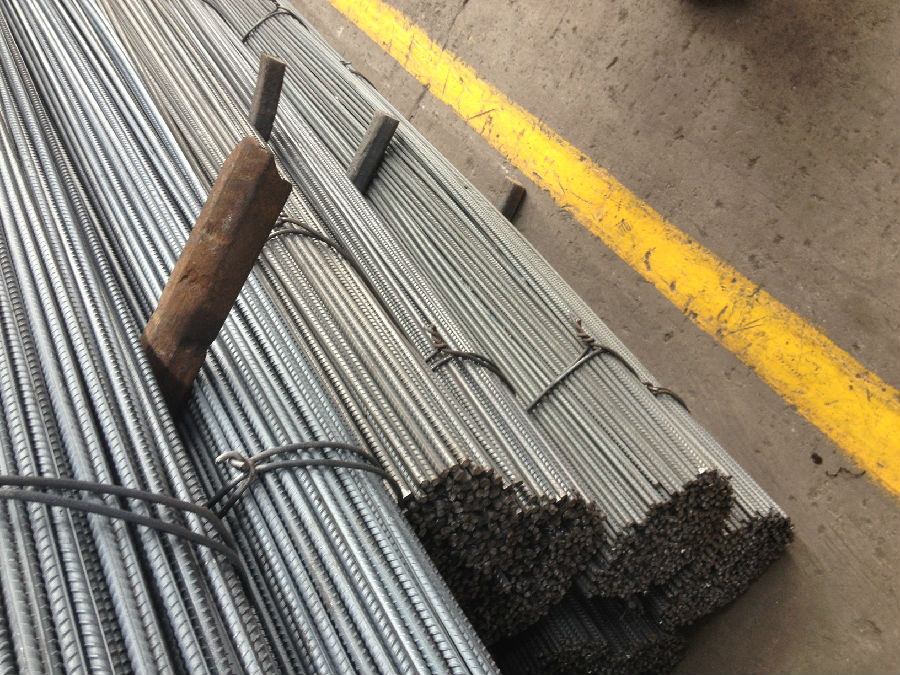
- Q: How are steel rebars used in the construction of airports?
- Steel rebars are extensively used in the construction of airports to provide structural reinforcement and ensure the overall strength and stability of various concrete structures. Rebars, also known as reinforcing bars, are typically made of steel and are strategically placed within concrete elements such as beams, columns, slabs, and foundations. In airport construction, rebars are primarily used to reinforce the concrete in runways, taxiways, and aprons. Runways, being subjected to heavy loads and constant aircraft movements, require significant reinforcement to withstand the immense pressure and prevent cracking or structural failure. Steel rebars are embedded within the concrete to enhance its tensile strength, allowing it to bear these heavy loads without compromising the integrity of the runway. Similarly, taxiways and aprons, which accommodate aircraft taxiing, parking, and refueling, also rely on steel rebars for reinforcement. These areas experience continuous vehicle and equipment traffic, making them susceptible to wear and tear. Incorporating rebars in the concrete ensures that these surfaces can withstand the constant stress and weight of aircraft and vehicles, ensuring durability and longevity. In addition to runways, taxiways, and aprons, steel rebars are also used in the construction of other airport structures such as terminal buildings, control towers, hangars, and parking facilities. These structures require strong foundations and sturdy frames to support the weight of the building and withstand various environmental factors such as wind and seismic forces. Steel rebars are employed in these structures to reinforce the concrete foundations, columns, and beams, providing the necessary strength and stability. Overall, steel rebars play a crucial role in the construction of airports by enhancing the structural integrity and durability of various concrete elements. They ensure that airport facilities can withstand the heavy loads, constant traffic, and adverse weather conditions associated with air travel, ensuring the safety and efficiency of airport operations.
- Q: What are the safety precautions while handling steel rebars?
- When handling steel rebars, it is important to follow a few safety precautions. Firstly, always wear protective clothing such as gloves, safety glasses, and steel-toed boots to prevent injuries. It is crucial to lift and carry rebars properly, using proper lifting techniques and avoiding strain on your back. Additionally, be cautious of the sharp edges and points of the rebars to prevent cuts or punctures. Lastly, always store and stack rebars in a safe and organized manner to avoid accidents or tripping hazards.
- Q: Are steel rebars suitable for use in structures with high resistance to impact?
- Structures with high resistance to impact can generally make use of steel rebars. These rebars, also known as reinforcement bars, are made from steel and are commonly utilized in concrete structures to enhance their strength and durability. Steel possesses high tensile strength and the ability to absorb and distribute impact forces, making it an excellent material for reinforcement. In situations where impact is a concern, like in bridges, highways, or buildings located in earthquake-prone areas, steel rebars perform a critical function by providing additional strength and resistance. By incorporating rebars, the structure becomes capable of withstanding sudden impact loads and preventing catastrophic failures. Furthermore, engineers have the option to choose from various grades and sizes of steel rebars, ensuring that the appropriate type is selected based on the specific requirements of the structure. Higher grade rebars, such as Grade 60 or Grade 75, offer increased strength and ductility, making them particularly suitable for structures with high resistance to impact. It is worth noting that while steel rebars enhance the overall strength and impact resistance of a structure, other factors such as design, construction techniques, and maintenance also play significant roles in ensuring the structure's ability to withstand impact forces. Therefore, taking a comprehensive approach that encompasses all these factors is crucial when designing and constructing structures with high resistance to impact.
- Q: What are the different types of corrosion protection coatings for steel rebars?
- There are several types of corrosion protection coatings available for steel rebars, including epoxy coatings, zinc coatings, polyurethane coatings, and fusion bonded epoxy (FBE) coatings. These coatings provide a barrier between the steel surface and corrosive elements, preventing rust and extending the lifespan of the rebars in various environments.
- Q: How are steel rebars used in slab construction?
- Steel rebars are commonly used in slab construction to reinforce and strengthen concrete slabs. They are placed within the concrete before it is poured, forming a grid-like structure that provides added support to the slab. This helps to prevent cracking and structural failure, as the rebars help distribute the load and resist tension forces.
- Q: Can steel rebars be used in historical building preservation?
- Yes, steel rebars can be used in historical building preservation. Steel rebars provide additional strength and stability to the structure, which is essential for preserving and maintaining historical buildings. However, the use of steel rebars should be done carefully and in consultation with architectural and preservation experts to ensure that it does not compromise the historical integrity and aesthetic value of the building.
- Q: How do steel rebars affect the construction cost of high-rise buildings?
- Steel rebars have a significant impact on the construction cost of high-rise buildings. These reinforced steel bars are essential for providing strength and stability to the structure, especially in high-rise buildings that face greater structural loads. Firstly, the cost of steel rebars themselves can be a substantial portion of the overall construction budget. The price of steel rebars is subject to market fluctuations, and as such, any increase in steel prices can directly impact the construction cost. Additionally, the quantity and quality of rebars required for a high-rise building are typically higher compared to low-rise structures, further contributing to the overall cost. Moreover, the installation of steel rebars involves skilled labor and specialized equipment, which adds to the construction cost. The process of reinforcing concrete with steel rebars requires careful planning, precise placement, and adherence to construction codes and safety standards. This necessitates the employment of experienced and qualified workers, resulting in higher labor costs. Furthermore, the use of steel rebars helps improve the durability and longevity of high-rise buildings. By providing reinforcement, rebars enhance the structural integrity of the building, making it more resistant to various forces such as earthquakes, wind, and vibrations. This, in turn, reduces the maintenance and repair costs over the building's lifespan, making the initial investment in steel rebars a worthwhile expense. Lastly, steel rebars contribute to the overall construction timeline and project schedule. As a critical component of the building's structure, the installation of rebars is typically time-consuming. Delays or errors in this process can result in project delays and additional costs. Therefore, proper planning, coordination, and supervision are essential to ensure the efficient and timely installation of rebars, minimizing any potential cost overruns. In conclusion, steel rebars play a crucial role in the construction of high-rise buildings, affecting the overall cost significantly. While the direct cost of rebars themselves, labor, and specialized equipment contribute to the construction expenses, their use ultimately enhances the building's strength, durability, and longevity. Therefore, considering the long-term benefits and the importance of structural integrity, the inclusion of steel rebars is necessary, despite their impact on the construction cost.
- Q: What are the advantages of using composite steel rebars?
- There are several advantages of using composite steel rebars. Firstly, composite steel rebars offer higher tensile strength compared to traditional steel rebars, making them more durable and resistant to deformation. Secondly, they have a lower coefficient of thermal expansion, reducing the risk of cracking and improving long-term performance. Additionally, composite steel rebars are corrosion-resistant, ensuring a longer lifespan and lower maintenance costs. Furthermore, these rebars are lighter in weight, making them easier to handle and transport. Lastly, composite steel rebars can be easily fabricated and installed, allowing for greater design flexibility and faster construction.
- Q: What are the guidelines for the proper anchoring of steel rebars in slabs?
- The proper anchoring of steel rebars in slabs is crucial to ensure the structural integrity and strength of the concrete slab. Here are some guidelines to follow: 1. Embedment depth: The rebars should be embedded in the concrete slab to a specific depth. The depth is typically determined based on the size and strength of the rebars and the load requirements of the slab. It is important to follow the recommended embedment depth to ensure adequate transfer of forces between the rebar and the concrete. 2. Spacing: The rebars should be spaced at regular intervals within the slab to provide uniform reinforcement. The spacing is determined based on the design requirements and the expected load on the slab. Following the recommended spacing guidelines will help distribute the load evenly and prevent cracking or failure of the slab. 3. Lap length: When multiple rebars need to be joined together, a lap splice is used. The lap length is the minimum length of overlap required to ensure proper transfer of forces between the rebars. It is important to follow the specified lap length to maintain the integrity of the reinforcement. 4. Edge distance: The rebars should be placed at a certain distance from the edges of the slab to prevent edge failure. The edge distance is determined based on factors such as the bar size, concrete cover, and design requirements. Maintaining the specified edge distance will help ensure the rebars are adequately anchored and prevent concrete spalling or cracking near the edges. 5. Concrete cover: The rebars should have a minimum concrete cover to protect them from corrosion and provide fire resistance. The concrete cover is the distance between the outer surface of the rebar and the nearest concrete surface. Following the recommended concrete cover guidelines will help maintain the durability and longevity of the steel rebars. 6. Proper placement and alignment: The rebars should be accurately placed and aligned within the slab to provide effective reinforcement. They should be positioned at the correct depth, spacing, and alignment as per the design specifications. Proper placement and alignment will ensure the rebars are securely anchored and contribute to the overall strength of the slab. It is important to note that these guidelines may vary depending on the specific project requirements, local building codes, and design standards. Therefore, it is recommended to consult with a qualified structural engineer or follow the guidelines provided by relevant authorities to ensure the proper anchoring of steel rebars in slabs.
- Q: How are steel rebars protected against accidental damage during construction?
- Steel rebars are protected against accidental damage during construction through various measures. One common method is to cover them with plastic caps or sleeves that provide a physical barrier and prevent them from being hit or damaged by construction equipment or debris. Additionally, rebars are often placed in designated areas and marked with caution tape to make workers aware of their presence and avoid accidental damage. Regular inspections are carried out to ensure rebars are not exposed or damaged, and if necessary, temporary barriers or covers are used to protect them until construction work is completed.
Send your message to us
rebar steel 6mm/hot rolled deformed steel rebar
- Loading Port:
- Tianjin
- Payment Terms:
- TT OR LC
- Min Order Qty:
- 25 m.t.
- Supply Capability:
- 23000 m.t./month
OKorder Service Pledge
OKorder Financial Service
Similar products
Hot products
Hot Searches
Related keywords
